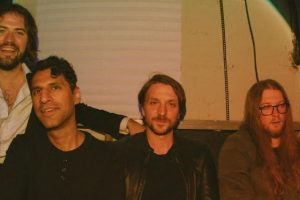Photo Credit: Gianna Leo Falcon
Almost a month has gone by since Public Speaking dropped Six Golden Tumors. An album most would define as abstract, it takes a whirlwind of influences, sounds, and intentions and formulates them into Avant rock unlike most have ever heard. Getting to speak with Public Speaking, even for just a moment, was a trip that now you’ll get to take as we get into everything from biblical notes to musical growth.
Kendra: Were you always focused on music or did that need to create musically come to life around the late 2010’s right before you dropped your debut in 2013?
Public Speaking: I taught myself guitar and piano in my late teens, and I moved to New York in my early twenties to start a band. I formed a few rock bands and then started performing solo in 2008 or so. It was just me and an acoustic guitar for a while, but pedals and electronics gradually infiltrated and usurped the guitar. I began experimenting with wholly improvised sets of voice and electronics around 2012, and then I wrote songs using the processes I learned.
Kendra: Time and time again your sound has been described as “abstract.” Whenever I hear that and listen myself, I think of how abstract artists can put together random pieces of their chosen medium to produce an end result that makes sense in a sort of controlled chaos in their vision. Would you say that’s close to your process? Piecing together the random to create your vision?
Public Speaking: For me, it has been less and less random and chance-based and more conceptualized and intentional. The sounds I use for a particular song usually have some relational meaning to the theme – sometimes literal, sometimes emotional and impressionistic. But I’m always trying to use these “abstract” sounds in the service of the song. Controlled chaos or carefully articulated noise is relevant though. And I often hear abstract sounds in my head that I must find a way to reproduce by seeking out or recording a sample close to this sound and then digitally manipulating it to bring it closer to what I hear within: to bring it forth into the world. On this latest album, I used a lot of wooden sources, as well as animals like grizzly bears and whales to aid the stories. This helps to locate the music in a natural, primitive setting and emphasize the bestial, the carnal.
Kendra: It’s been a couple of years between your last release and 2019’s Six Golden Tumors. How do you feel your overall approach to making music has grown in that time?
Public Speaking: On my prior album Grace Upon Grace I was very concerned with melodicism and very gentle, pretty sounds, whereas Six Golden Tumors is more focused on arranging noises and using less of traditional instrumentation. But both were created from the ground up by making new percussive sounds and composing with them. Both records are also a continuation, and hopefully intensification of something I started with 2016’s Caress Redact.
I wanted to use less sound in general and create more space in the compositions so that what remains is more powerful and essential. I tried to remove elements as frequently as I added them, or at least to cut them up and whittle them down to smaller blades of sound. Even though I’m very proud of Six Golden Tumors I know that I’ve failed in the mission to create music that resembles something like the emaciated sculptures of Alberto Giacometti, but I will try harder next time to get closer to the sound I’m chasing.
Kendra: Six Golden Tumors was influenced by a lot of things from horror movie scores to biblical texts, which to some could be seen as one and the same as they both showcase gore and humanity. What made you want to pull from each of these for this record?
Public Speaking: As an atheist, I’ve always had this fascinated outsider perspective on the Bible. It is this mystical, magical, otherworldly collection of stories that have shaped and framed much of western thought. I had read bits and pieces before, but for this project, I read most of the Hebrew Bible, the Christian Gospels, and more. That lead me to Dante’s “Inferno” which lead me to Greek and Roman mythology.
I also did a lot of research regarding early Christian history, witchcraft persecution, and western antiquity. The idea linking horror movies to the more violent and fantastical stories in the Bible came from watching these movies and connecting the murderer/monster chasing their victims through the woods to the early Christian fear of the pagan wilderness, and thus the devil. I also wanted to explore our concept of Hell and why we see eternal violence and suffering as the ultimate justice.
Kendra: You were out on the road this summer, but do you have any fall dates planned or are you breaking until 2020?
Public Speaking: I’ve had a fabulous tour so I’m currently looking at the logistics of some East Coast dates too. I’m also looking forward to collaborating on some performances with friends and playing in my new band Mantis Mantis. As far as Public Speaking, I’m recording sounds and making samples right now at a museum that’s under construction. I’ll be writing new songs with these and hopefully releasing a couple EP’s in a few months.






